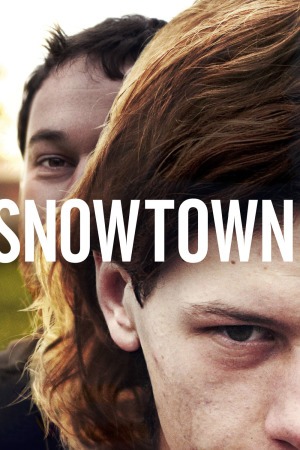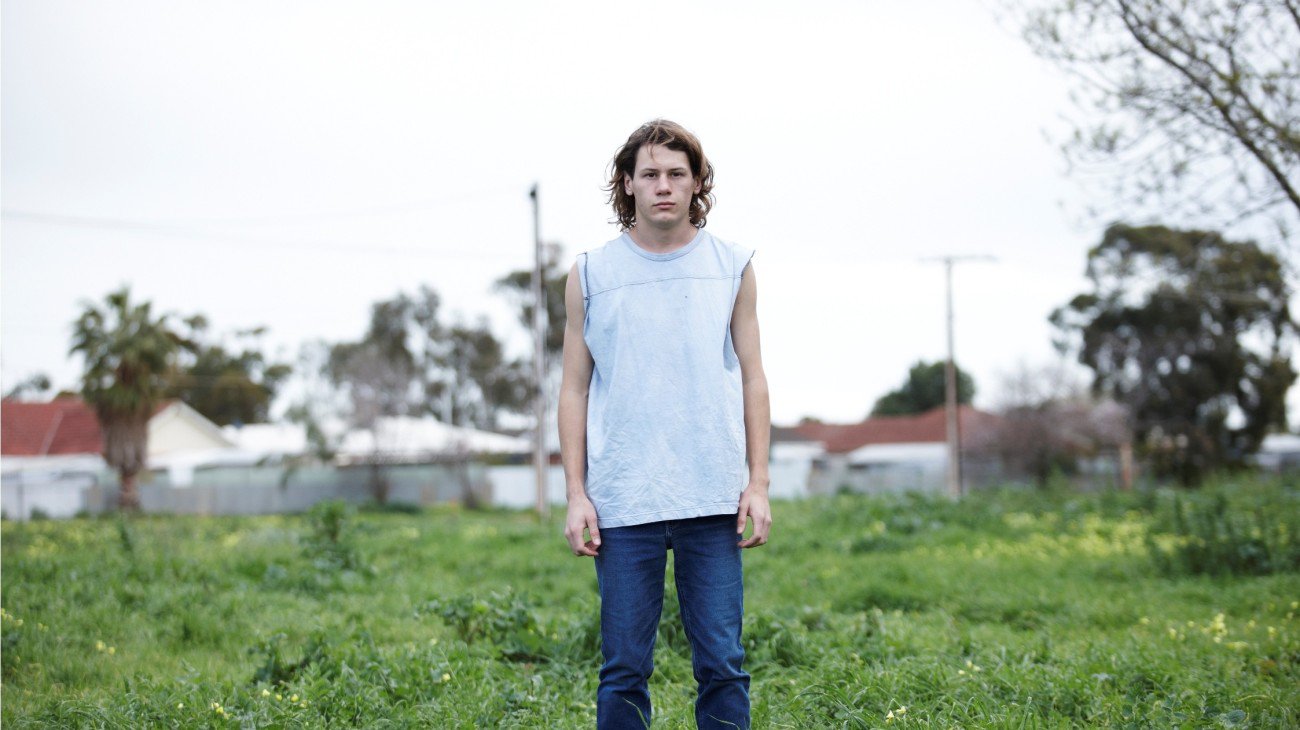
The 47th Chicago International Film Festival
Screens at CIFF: 10/14 & 10/15
World premiere: 16 May, 2011, Cannes Film Festival
It's a kind of weird achievement that Snowtown, the debut of Australian director Justin Kurzel, starts off by promising to be one kind of incredibly distressing movie and turns into another kind of even more incredibly distressing movie entirely; sort of like if you're promised a cigarette stubbed out on your face, but when you show up, they take a sledgehammer to your kneecaps. In both cases, Kurzel directs with an admirably controlled aesthetic detachment that serves to make the film even nastier: when a film is so obviously disaffected and denuded of any romanticism or sentiment or feeling towards its characters, you don't get any kind of comfort in the idea that, heck, this is a movie, so of course everything is going to turn out all right. "No", says Snowtown, "everything is going to turn out fairly dreadfully, and we shan't hold back in depicting that, with relish."
The film starts with Elizabeth (Louise Harvey), a single, middle-aged woman, leaving her boys - 16-year-old Jamie (Lucas Pittaway), and his two younger half-brothers - with the across the street neighbor (and, it's implied, her lover), who sits around the table shooting the shit with them for a while; and then sometime later takes photographs of the three kids posing nude - the transition from one moment to the next happening with nauseating, disorienting suddenness, and the banally unstressed POV shots of the boys, forcibly jamming the viewer into the pedophile's place, is even more upsetting still. One cannot deny that this fills exactly the function that Kurzel probably wanted: it drop-kicks the audience into a septic pool of nastiness, and it does so with considerable filmmaking verve. But more on that anon.
In short order, the family has linked up with the charismatically bearded guy with a round, happy face, John Bunting (Daniel Henshall). He's exactly what they need at this trying moment: a sweetheart, a role model for Jamie, and a ravenous, psychotic hater of perverts. Bunting masterminds a program of harassment against the neighbor, which consists mainly of tossing the bloody chunks of dismembered kangaroos on his front stoop, in a sequence that doesn't leave an awful lot to the imagination. But happily, the kanagaroos seem to have already been dead when they showed up on set. That's a thing, anyway.
Long story short, Bunting is bugfuck nuts, and pursues with puritanical zeal a quest to destroy sexual deviants - pedophiles for choice, but suspected pedophiles will do in a pinch, and then gay men, and then just sort of whatever folk are in the wrong place. All of this happened, by the way: between 1992 and 1999, Bunting was the leader of a group convicted of killing 11 persons, with a 12th not conclusively proven to have been murdered (Kurzel and writer Shaun Grant include her). The bodies were found under very unpleasant circumstances in Snowtown, South Australia, hence the film's title. This was the most prolific serial killing career in Australian history, and, one hopes, the nastiest, because from what we see, dismembered kangaroo chunks would count as incredibly sweet and sunny by Bunting's standards.
The film compresses things, to make it more about the adolescent Jamie (serving four life sentences with a 26-year non-parole period) and his relationship with surrogate father Bunting, with particular attention to the manner in which the boy's dawning horror at Bunting's bloodlust shades into acceptance, after a fashion. If "fatherless boy lets himself be sucked into a serial killer's sphere of influence" sounds like a compelling character study, then you're in luck, because that's almost the entirety of what Snowtown has to offer as far as drama or a narrative arc. It tries, fairly hard at that, to succeed as a "mind of a killer" picture, but Kurzel is plainly spooked by Bunting, and while the filmmaker is entirely good about observing the murder's behavior with unblinking steadiness, that observation never becomes insight. At the risk of being one of Those Critics, the film absolutely does not have a point: nothing to say about violence, about the way that people's minds work, about the cruelty of the universe, about anything.
And I'll certainly concede that, as an exercise in creating a profound sense of discomfort and even disgust, the film is fucking brilliant: particularly in the aggressive sound mix that makes every Foleyed-in squelch echo around in your head for several seconds until it dies down and makes way for the next sound of human misery. Kurzel is a fantastic craftsman, at the very least; but as a storyteller, he reveals no obvious capacity for drawing meaning out of the things he has crafted. Snowtown is amazingly repellent, but it is only repellent, and it has no particular observations about the mind of psychopaths that is worth the incredibly nasty feeling you get from sitting through its incredibly grim two hours.
6/10
World premiere: 16 May, 2011, Cannes Film Festival
It's a kind of weird achievement that Snowtown, the debut of Australian director Justin Kurzel, starts off by promising to be one kind of incredibly distressing movie and turns into another kind of even more incredibly distressing movie entirely; sort of like if you're promised a cigarette stubbed out on your face, but when you show up, they take a sledgehammer to your kneecaps. In both cases, Kurzel directs with an admirably controlled aesthetic detachment that serves to make the film even nastier: when a film is so obviously disaffected and denuded of any romanticism or sentiment or feeling towards its characters, you don't get any kind of comfort in the idea that, heck, this is a movie, so of course everything is going to turn out all right. "No", says Snowtown, "everything is going to turn out fairly dreadfully, and we shan't hold back in depicting that, with relish."
The film starts with Elizabeth (Louise Harvey), a single, middle-aged woman, leaving her boys - 16-year-old Jamie (Lucas Pittaway), and his two younger half-brothers - with the across the street neighbor (and, it's implied, her lover), who sits around the table shooting the shit with them for a while; and then sometime later takes photographs of the three kids posing nude - the transition from one moment to the next happening with nauseating, disorienting suddenness, and the banally unstressed POV shots of the boys, forcibly jamming the viewer into the pedophile's place, is even more upsetting still. One cannot deny that this fills exactly the function that Kurzel probably wanted: it drop-kicks the audience into a septic pool of nastiness, and it does so with considerable filmmaking verve. But more on that anon.
In short order, the family has linked up with the charismatically bearded guy with a round, happy face, John Bunting (Daniel Henshall). He's exactly what they need at this trying moment: a sweetheart, a role model for Jamie, and a ravenous, psychotic hater of perverts. Bunting masterminds a program of harassment against the neighbor, which consists mainly of tossing the bloody chunks of dismembered kangaroos on his front stoop, in a sequence that doesn't leave an awful lot to the imagination. But happily, the kanagaroos seem to have already been dead when they showed up on set. That's a thing, anyway.
Long story short, Bunting is bugfuck nuts, and pursues with puritanical zeal a quest to destroy sexual deviants - pedophiles for choice, but suspected pedophiles will do in a pinch, and then gay men, and then just sort of whatever folk are in the wrong place. All of this happened, by the way: between 1992 and 1999, Bunting was the leader of a group convicted of killing 11 persons, with a 12th not conclusively proven to have been murdered (Kurzel and writer Shaun Grant include her). The bodies were found under very unpleasant circumstances in Snowtown, South Australia, hence the film's title. This was the most prolific serial killing career in Australian history, and, one hopes, the nastiest, because from what we see, dismembered kangaroo chunks would count as incredibly sweet and sunny by Bunting's standards.
The film compresses things, to make it more about the adolescent Jamie (serving four life sentences with a 26-year non-parole period) and his relationship with surrogate father Bunting, with particular attention to the manner in which the boy's dawning horror at Bunting's bloodlust shades into acceptance, after a fashion. If "fatherless boy lets himself be sucked into a serial killer's sphere of influence" sounds like a compelling character study, then you're in luck, because that's almost the entirety of what Snowtown has to offer as far as drama or a narrative arc. It tries, fairly hard at that, to succeed as a "mind of a killer" picture, but Kurzel is plainly spooked by Bunting, and while the filmmaker is entirely good about observing the murder's behavior with unblinking steadiness, that observation never becomes insight. At the risk of being one of Those Critics, the film absolutely does not have a point: nothing to say about violence, about the way that people's minds work, about the cruelty of the universe, about anything.
And I'll certainly concede that, as an exercise in creating a profound sense of discomfort and even disgust, the film is fucking brilliant: particularly in the aggressive sound mix that makes every Foleyed-in squelch echo around in your head for several seconds until it dies down and makes way for the next sound of human misery. Kurzel is a fantastic craftsman, at the very least; but as a storyteller, he reveals no obvious capacity for drawing meaning out of the things he has crafted. Snowtown is amazingly repellent, but it is only repellent, and it has no particular observations about the mind of psychopaths that is worth the incredibly nasty feeling you get from sitting through its incredibly grim two hours.
6/10






